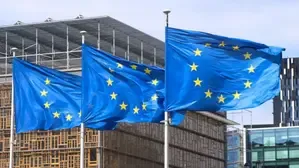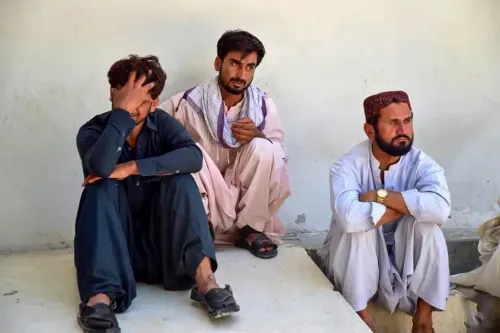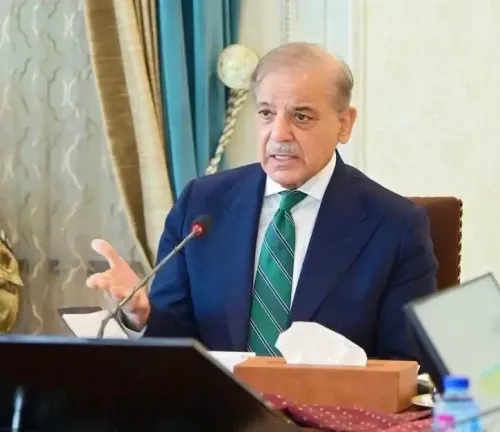EU's Efforts for a UN Biodiversity Finance Agreement

Synopsis
Key Takeaways
- EU is committed to biodiversity finance agreements.
- Negotiations aim to resolve funding gaps and enhance monitoring.
- Global Biodiversity Framework targets include $200 billion per year by 2030.
- Collaboration among nations is crucial for successful outcomes.
- Significant funding increases are pledged by donor nations.
Rome, Feb 24 (NationPress) Just hours before the three-day UN global biodiversity negotiations resume in Rome, the European Union (EU) announced its commitment to reach an agreement on outstanding matters from COP16 regarding biodiversity.
According to a statement from the European Commission, "The EU is advocating for the resolution of all pending decisions, particularly concerning resource mobilisation, the monitoring framework, and the implementation review procedures."
On Tuesday, various nations, including India, will reconvene as discussions recommence under the 16th Conference of the Parties to the Convention on Biological Diversity (CBD COP16), aiming to finalize essential issues critical for executing the historic Kunming-Montreal Global Biodiversity Framework (GBF), which strives to halt and reverse biodiversity loss by 2030.
The focus will be on achieving consensus on how to address the biodiversity funding gap by mobilising resources from diverse sources, establishing robust review mechanisms, and updating the monitoring framework.
Advancing the implementation of the GBF is vital for achieving harmony with nature, which is crucial for economies, food security, health, well-being, effective climate action, and resilience.
In a challenging geopolitical context that also impacts biodiversity policies and financing, a successful outcome in Rome would represent a significant milestone.
EU Commissioner for the Environment, Water Resilience, and a Competitive Circular Economy, Jessika Roswall, stated: "The EU and its member states are fully dedicated to implementing the Global Biodiversity Framework. During these resumed negotiations, we must collaboratively find ways to continue mobilising resources from all available sources to ensure effective and coherent biodiversity financing beyond 2030. We are prepared to collaborate with all parties to progress and build on the achievements made in Cali."
The 16th CBD Conference of the Parties in Cali, Colombia, held in October 2024, was deemed largely successful, yielding various accomplishments. However, consensus was not reached on all decisions necessary for the framework's proper implementation.
The EU is engaging with partners to reach agreement on all pending draft decisions: resource mobilisation, financing mechanisms, monitoring frameworks, planning arrangements, monitoring, reporting, reviews, financial mechanisms, cooperation among multilateral environmental agreements and international organisations, multi-year work programmes, and administrative issues. Most discussions are expected to focus on resource mobilisation.
In other matters, reasonable compromises appear attainable. The EU and its member states are the primary contributors to international biodiversity funding. The European Commission has already declared its intention to double its international biodiversity financing to EUR 7 billion for the 2021-2027 timeframe.
This includes significant initiatives like the EUR 1.4 billion NaturAfrica program. Most support is provided through bilateral cooperation, aimed at assisting partners in implementing the GBF.
Additionally, the EU intends to leverage further funding from domestic or private sectors by employing various strategies (blending, guarantees, green bonds). The European sustainable financing initiative will help channel additional investments into biodiversity. From 2026 onwards, the EU budget will allocate 10% for biodiversity-related activities.
The EU is also working to integrate biodiversity into other funding programs, maximising synergies with its climate agenda. The Kunming-Montreal Global Biodiversity Framework outlines ambitious goals for biodiversity financing, both domestically and internationally.
During the meeting in Montreal, countries agreed to boost global biodiversity finance to $200 billion per year by 2030, sourced from all avenues: domestic and international, public and private.
Donor nations also pledged to raise international biodiversity finance to $20 billion by 2025 and $30 billion by 2030. The Global Biodiversity Framework (GBF) provides explicit goals and targets, along with a roadmap to protect and restore biodiversity worldwide.
The COP16 meeting in Cali, Colombia, marked the first gathering of nations following the signing of the GBF in 2022.









